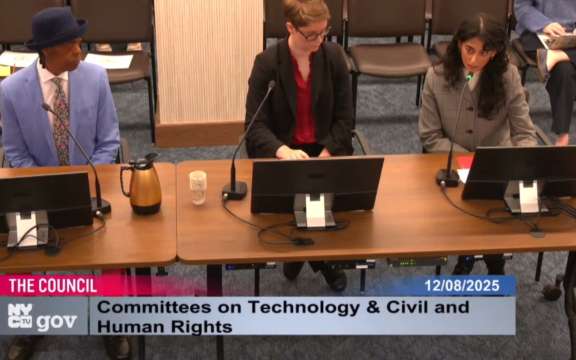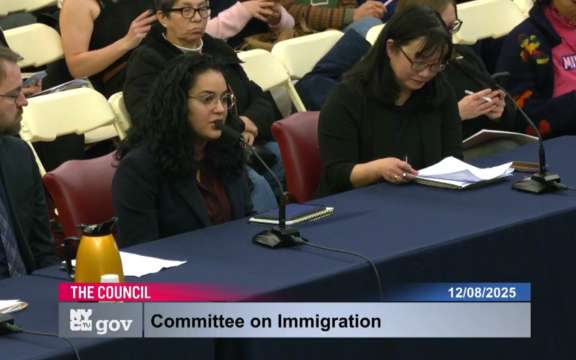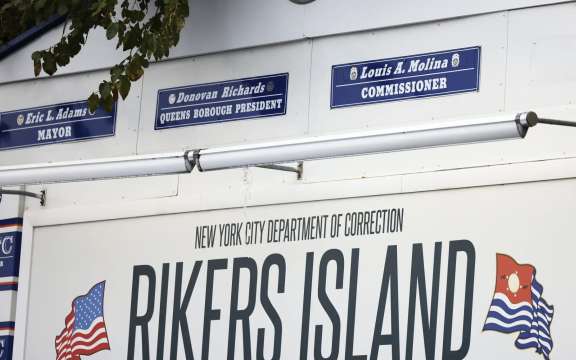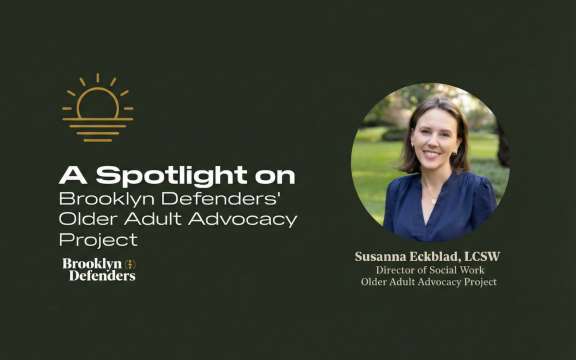BDS Testimony Before New York City Council on Employment Discrimination for those with Unsealed Violations or Pending Charges
TESTIMONY OF:
Shelle Shimizu – Staff Attorney
BROOKLYN DEFENDER SERVICES
Presented before the New York City Council Committee on Civil and Human Rights
Hearing Regarding Proposed Int. No. 1314-A
January 22, 2020
My name is Shelle Shimizu and I am an attorney in the Employment Law Unit at Brooklyn Defender Services (BDS). BDS provides multi-disciplinary and client-centered criminal, family, and immigration defense, as well as civil legal services, social work support and advocacy in approximately 30,000 cases in Brooklyn every year. I thank the New York City Council Committee on Civil and Human Rights and Chair Mathieu Eugene for the opportunity to testify today about discrimination based on arrest record, pending criminal accusation or criminal convictions.
BDS’s employment practice provides legal representation and informal advocacy to people facing employment discrimination due to current or prior contact with the criminal justice system. Our clients face numerous formal and informal barriers to employment. Many are suspended or terminated from employment upon arrest and absent any finding of criminal culpability. Others are completely excluded from employment opportunities due to their criminal histories. I have represented numerous clients who have lost, or have been completely excluded from, employment opportunities due to current or prior criminal justice involvement.
Background
In 2019, New York State implemented legislation to expand criminal record discrimination protections to include people who have received adjournments in contemplation of dismissal (ACD). While an ACD is not yet a sealed record under the provision of the Criminal Produce Law, and is and therefore is not considered "terminated" in the defendant's favor, these cases are routinely dismissed and sealed after the passage of six months or a year, depending on the charge. The passage of A. 4038A/S. 3205A brought arrested persons whose criminal charges have been ACDed within the protection of those provisions or the Human Rights Law and the Criminal Procedure Law which prevent employment discrimination against persons who have been arrested but not convicted or any crime.
A large and vulnerable population is still excluded from these protections—current employees with open cases. In 2017, approximately 240,000 adult arrests were made in New York City. This means that up to a quarter million New Yorkers were vulnerable to employment-related collateral consequences and were excluded from legal protection.[1]
Similar to ACDs, many cases resolve with a plea to a violation such as disorderly conduct, instead of a higher charge. Our clients are sentenced to a one year conditional charge. In Brooklyn, these clients must often wait for the one year conditional charge to elapse before the Court automatically seals these dispositions. This bill would expand the protections offered to those with ACDs to those with violations.
Client Stories
Ms. H worked as a home-health aide caring for elderly individuals, a position she held for nearly eight years. In 2017, Ms. H was arrested while trying to physically defend herself from her sibling. Although she did not have a prior criminal history, as a result of the arrest, Ms. H was suspended from her job without pay or benefits. At the time, she was the sole financial provider for her children. It took nearly two months for her case to be dismissed, and every day she worried about losing her home and providing for her children. After her defender successfully negotiated a non-criminal disposition, her employer eventually allowed her to return to work. No court ever found Ms. H guilty of a crime. Nonetheless, she could not help but feel that she had been punished.
Ms. DM worked a counselor for children and was suspended from work due to an arrest. The arrest stemmed from an alleged altercation with her sister. Even though the allegations were not directly related to her position, her employer refused to allow her to return to work. At this time Ms. DM’s criminal defense attorney predicted that her case would be open for another 3 months. Ms. DM tried to apply for new jobs, but other employers would not hire her due to her open case. Ms. DM reached out the employment unit for assistance because she had no way to pay her rent or provide for her child. She was worried that she and her child would need to enter the shelter system if she did not find work soon. Our employment unit engaged in direct advocacy with the employer and through many conversations we were able to get Ms. DM back to work months before her case was resolved.
Ms. D worked as a home attendant prior to her arrest in May 2019, when she lost her employment. In October 2019, her criminal case favorably resolved with a violation that will eventually be sealed. Unfortunately, Ms. D. continued to have difficulty finding work because background checks continued to show that she had an open case. Although she was eventually able to correct that misinformation with information about the violation, the unsealed violation itself has posed a problem for her ability to find a job despite numerous applications and interviews, and she remains unemployed as of the date of this testimony.
Intr. 1314-2018
BDS supports Intr. 1314-2018, which would amend the administrative code of the city of New York, in relation to prohibiting discrimination based on one’s arrest record, pending criminal accusations or criminal convictions.
Many BDS clients are suspended or terminated from their current employment merely because of an arrest. This is alarming because an arrest does not amount to a finding of criminal culpability—by definition, neither guilt nor innocence has been adjudicated by a court of law at the charging stage of the criminal process. Further, individuals are too often arrested and processed through the criminal justice system without any criminal culpability: overpolicing of communities and persons of color, unnecessary intrusion into domestic affairs, and false reports can all factor into an individual’s arrest.[2]
A recent Bronx Defenders study underscores this point, finding that the typical defendant charged with misdemeanor drug possession wishing to fight her case could expect to wait 240 days and make five court appearances before any disposition is reached.[3] In the meantime, if she is employed, she could be suspended without pay, lose her health and employment benefits, and even be terminated due to her open case. Unemployed and without income, she will not only face an uphill battle to obtain government benefits, but will also find it very difficult to find alternative work as certain employers will hold applications in abeyance until the case is resolved.[4]
Additionally, removing these barriers to hiring, licensing, and continued employment will help reduce collateral consequences in other areas and help ensure New Yorkers who rely on employment income don’t fall behind on rent, car payments, and countless other financial obligations solely because of favorably resolved contact with the criminal justice system.
Conclusion
BDS is grateful to New York City Council Committee on Civil and Human Rights for hosting this critical hearing and shining a spotlight this issue. Thank you for your time and consideration of my comments.
If you have any questions, please feel free to reach out Kathleen McKenna, Policy Social Worker at kmckenna@bds.org
or 718-254-0700 x210.
[1] Adult Arrests: 2008-2017, N.Y. Division of Crim. J. Servs. (Feb. 16, 2018), http://www.criminaljustice.ny.gov/crimnet/ojsa/arrests/nyc.pdf [https://perma.cc/W5YE-SQX7].
[2] See Floyd v. City of New York, 959 F. Supp. 2d 540, 562 (S.D.N.Y. 2013) (finding that New York Police Department officers engaged in “indirect racial profiling” by targeting racial minority neighborhoods at higher rates); see also Harold Stolper & Jeff Jones, The Crime of Being Short $2.75: Policing Communities of Color at the Turnstile, Community Services Soc’y (October 2017), http://lghttp.58547.nexcesscdn.net/803F44A/images/nycss/images/uploads/pubs/Fare_Evasion_FINAL_10_6_17_smaller.pdf [https://perma.cc/Y49M-GM3S]; Racial Disparities in NYC Arrest Data for Marijuana Possession, Innocence Project (May 14, 2018), https://www.innocenceproject.org/racial-disparities-in-nyc-arrest-data-marijuana-possession/ [https://perma.cc/GBG7-NVFZ] (finding that between January and March of 2018, 93% of those arrested for marijuana use were persons of color.)’ See generally Michelle Alexander, The New Jim Crow: Mass Incarceration in the Age of Colorblindness (2010); Dorothy E. Roberts, Prison, Foster Care, and the Systemic Punishment of Black Mothers, 59 UCLA L. Rev. 1474 (2012) (discussing overpolicing in communities of color).
[3] No Day in Court: Marijuana Possession Cases and the Failure of the Bronx Criminal Courts, Bronx Defenders Fundamental Fairness Project 6 (May 2013), http://www.bronxdefenders.org/wp-content/uploads/2013/05/No-Day-in-Court-A-Report-by-The-Bronx -Defenders-May-2013.pdf [https://perma.cc/SGM2-VTNT].
[4] For example, the New York State Justice Center, which regulates all organizations within New York that work with individuals with disabilities or special needs, will hold certain individual applications in abeyance until their case is resolved. N.Y. Comp. Codes R. & Regs. tit. 14, § 701.6 (2018); see also Division of State Gov’t Accountability, Criminal History Background Checks of Unlicensed Health Care Employees, N.Y. Off. of State Comptroller 2, https://osc.state.ny.us/audits/allaudits/093017/16s65.pdf [https://perma.cc/3JZ6-29HM].



